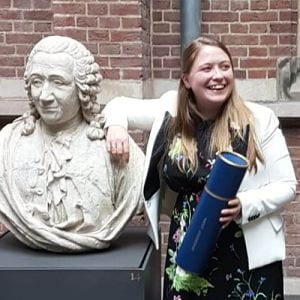Maths, magic and mobile phone security
Cryptography, a combination of maths, computer science, electrical engineering and physics, is the study of encryption and decryption. It keeps our communications and our data safe, as we spend ever more of our lives online.
We talked to Dr Chloe Martindale, a researcher and lecturer in cryptography.
This year’s theme for International Women in Engineering Day is ‘Shape the World’. How will engineers do that in the next decade?
Engineers are constantly shaping the world in many ways! One way coming soon that’s related to my field of research is that engineers might manage to build large-scale quantum computers in the next ten years. That’s a computer that relies on quantum physics, so very different from your laptop. Quantum computers could run calculations to massively improve our understanding of cancer and help us to work towards a cure, for example. But they will also mean that the encryption keeping our smartphone records private and our money in our bank accounts is obsolete, so it’s a double-edged sword.
Why would more female engineers benefit society?
Everyone should have an occupation they enjoy and that they’re good at, and a supportive work environment. I can’t count the number of times female friends have said they wished they’d gone into engineering. They found it fascinating but they were afraid they weren’t good enough because of the culture they were brought up in. If something is exciting and interesting, go for it. Everybody finds engineering hard at some point and to succeed, you have to keep trying until you understand. Having more women in the sector will change the culture so girls aren’t discouraged from following their passion.
That’s why outreach is important. As a student I went into schools as one of “Marcus’ Marvellous Mathemagicians”. We showed how you can use maths to win games like Monopoly and win the most money in the lottery (if you win, the chances of which are still small). We also performed on the street, for example doing magic card tricks and escaping from handcuffs using maths, and we ran maths walking tours around different cities, to show people the mathematical highlights.
Your studies took you abroad, why was that and where did you go?

I took a bachelors and then a master’s degree in maths. I’ve always loved maths – the more you study it, the more you realise you have to learn. I moved to Leiden in the Netherlands for my PhD, also in maths, because I wanted to work with a Dutch professor whose research I found really interesting. During my PhD I moved to Bordeaux in France for six months to work with the specialists there for a research project.
After my PhD I moved university to Eindhoven. I wanted to change my research focus to cryptography and there’s a brilliant group there led by a cryptographer who is also a mathematician. She helped me get into my new research topic.
What was your favourite toy as a child?
Probably my dolls house, I definitely played with it every day and begged for tiny furniture for every birthday and Christmas present for almost my whole childhood!
You’re relatively new to Bristol, how are you finding it here?
I love the people. Everyone I’ve met, both at the university and outside of it, has been incredibly welcoming and proud of Bristol as well. I have received so many recommendations for places to go and food to eat, it’ll take me years to get through them all once we emerge from the COVID-19 lockdown!
Expand your knowledge
Cryptography Research Group
Chloe’s article on Isogeny-based (post quantum) cryptography


